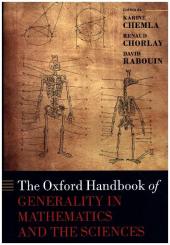 Neuerscheinungen 2016Stand: 2020-02-01 |
Schnellsuche
ISBN/Stichwort/Autor
|
Herderstraße 10
10625 Berlin
Tel.: 030 315 714 16
Fax 030 315 714 14
info@buchspektrum.de |

Karine Chemla, Renaud Chorlay, David Rabouin
(Beteiligte)
The Oxford Handbook of Generality in Mathematics and the Sciences
Ed. by Karine Chemla, Renaud Chorlay and David Rabouin
2016. 528 p. w. 37 figs. 247 mm
Verlag/Jahr: OXFORD UNIVERSITY PRESS; OUP OXFORD 2016
ISBN: 0-19-877726-4 (0198777264)
Neue ISBN: 978-0-19-877726-7 (9780198777267)
Preis und Lieferzeit: Bitte klicken
This collection of original essays aims to inquire into the diversity of Generality. Through case studies taken from the history of mathematics, physics and the life sciences, the book provides evidence of different ways of understanding the general in various contexts.
Generality is a key value in scientific discourses and practices. Throughout history, it has received a variety of meanings and of uses. This collection of original essays aims to inquire into this diversity. Through case studies taken from the history of mathematics, physics and the life sciences, the book provides evidence of different ways of understanding the general in various contexts. It aims at showing how collectives have valued generality and how they have
worked with specific types of "general" entities, procedures, and arguments.
The books connects history and philosophy of mathematics and the sciences at the intersection of two of the most fruitful contemporary lines of research: historical epistemology, in which values (e.g. "objectivity", "accuracy") are studied from a historical viewpoint; and the philosophy of scientific practice, in which conceptual developments are seen as embedded in networks of social, instrumental, and textual practices. Each chapter provides a self-contained case-study, with a clear
exposition of the scientific content at stake. The collection covers a wide range of scientific domains - with an emphasis on mathematics - and historical periods. It thus allows a comparative perspective which suggests a non-linear pattern for a history of generality. The introductory chapter spells out the
key issues and points to the connections between the chapters.
This book astonishes with its richness, its methodological relevance, and its novelty. We must recommend this book to a readership specializing in the history and philosophy of science because of the variety of approaches grouped together and because of its undeniable programmatic virtue. Christophe Eckes and translated by Rachel Keith, The Journal of the International Society for the History of Philosophy of Science


